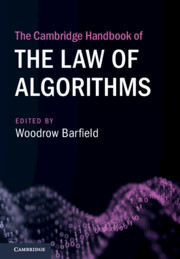Book contents
- The Cambridge Handbook of the Law of Algorithms
- The Cambridge Handbook of the Law of Algorithms
- Copyright page
- Contents
- Figures
- Tables
- Notes on Contributors
- Foreword
- Preface
- Acknowledgements
- Abbreviations
- Part I Introduction and Setting the Stage for a Law of Algorithms
- Part II Business, Regulations, and Decision-Making with Algorithms
- Part III Intellectual Property and Algorithms
- Part IV Criminal Law, Tort Issues, and Algorithms
- Part V Constitutional Law, Human Rights, and Algorithms
- 24 Human Rights-Based Approach to AI and Algorithms
- 25 Four Modes of Speech Protection for Algorithms
- 26 Algorithms and Freedom of Expression
- 27 Artificial Minds in First Amendment Borderlands
- 28 The First Amendment and Algorithms
- 29 Algorithmic Analysis of Social Behavior for Profiling, Ranking, and Assessment
- 30 Algorithmic Stages in Privacy of Data Analytics
- Part VI Applications and Future Directions of Law and Algorithms
- Index
27 - Artificial Minds in First Amendment Borderlands
from Part V - Constitutional Law, Human Rights, and Algorithms
Published online by Cambridge University Press: 19 October 2020
- The Cambridge Handbook of the Law of Algorithms
- The Cambridge Handbook of the Law of Algorithms
- Copyright page
- Contents
- Figures
- Tables
- Notes on Contributors
- Foreword
- Preface
- Acknowledgements
- Abbreviations
- Part I Introduction and Setting the Stage for a Law of Algorithms
- Part II Business, Regulations, and Decision-Making with Algorithms
- Part III Intellectual Property and Algorithms
- Part IV Criminal Law, Tort Issues, and Algorithms
- Part V Constitutional Law, Human Rights, and Algorithms
- 24 Human Rights-Based Approach to AI and Algorithms
- 25 Four Modes of Speech Protection for Algorithms
- 26 Algorithms and Freedom of Expression
- 27 Artificial Minds in First Amendment Borderlands
- 28 The First Amendment and Algorithms
- 29 Algorithmic Analysis of Social Behavior for Profiling, Ranking, and Assessment
- 30 Algorithmic Stages in Privacy of Data Analytics
- Part VI Applications and Future Directions of Law and Algorithms
- Index
Summary
The First Amendment’s freedom of speech, the Supreme Court said in 1943, protects our capacity to use words or non-verbal symbols to create a “short-cut from mind to mind.”1 But does it continue to do so when one of the “minds” on either end of such a short cut is an artificial one? Does it protect my right to receive words or symbols not from another person, but from artificial intelligence (AI) – that is, a computer program that can write, compose music, or perform other tasks that used to be the sole province of human intelligence? If so, what kind of First Amendment protection does computer speech receive – and how, if it all, does it differ from that which protects the speech of human persons?
Information
- Type
- Chapter
- Information
- The Cambridge Handbook of the Law of Algorithms , pp. 579 - 605Publisher: Cambridge University PressPrint publication year: 2020
